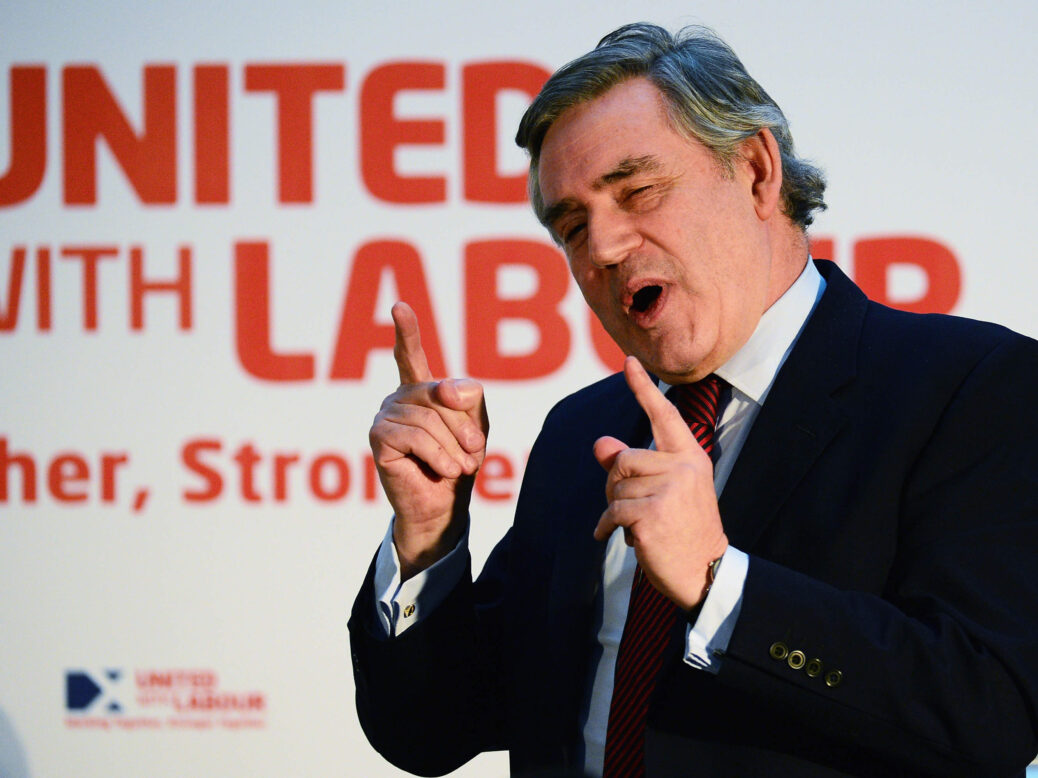
No party is more adept at exploiting the gap between practice and rhetoric in Scottish society than Labour, and no Scottish politician is more authentically Labour than Gordon Brown. After a series of relatively underwhelming, policy-focused speeches, the former Prime Minister has arrived back in the independence debate with a thud.
Over the last few days alone, he’s had his new book, My Scotland, Our Britain, serialised in the Daily Record, he’s mobilised Labour’s grassroots against separation and he’s published an essay in the Guardian casting the referendum as a chance to “demonstrate how distinct nations, proud of their cultural identities, can also transcend them.”
Brown’s heightened presence in the campaign is designed to stop the flow of low-income voters away from the Union and towards independence. So far, it seems to be working. Ipsos MORI’s latest poll shows support for independence among the poorest fifth of Scots down 4 per cent and among Labour voters down 10 per cent. The Yes camp knows it can’t afford to lose these (or any) people, so last weekend Alex Salmond announced plans to “reindustrialise” Scotland after a Yes vote. (Though how you do that using a currency – the pound – which has systematically undermined Scottish manufacturing exports for three decades, I don’t know).
Traditionally, Brown has struggled with “the national question”. In his introduction to The Red Paper on Scotland, published in 1975, he described the “oil-fired” rise of the SNP as “less an assertion of Scotland’s permanence as a nation” than “a response to Scotland’s uneven development”. But by the time he had become Chancellor of the Exchequer in 1997, his analysis had reversed. In a pamphlet, New Scotland, New Britain, written ahead of the first Scottish parliamentary elections, he dismissed “the cause of separation” as a “misguided retreat from … modern forces of change”.
During his 13 years in office Brown made various attempts to redefine “Britishness” as a progressive, 21st-century identity, but often ended up sounding like Enoch Powell. On a trip to Tanzania in 2005, he even told reporters that Britain shouldn’t be afraid to “celebrate” its colonial past.
With the referendum only three months away, Brown seems (again) to have re-evaluated his view of Scottish nationalism. In the Guardian, he identifies the “insecurity many Scots feel at the economic and social dislocation wrought by de-industrialisation” as a central component of the SNP’s recent success. “Of course, the quarrel Scots have is not with England”, he adds, “but alongside England, with globalisation”.
Here, however, Brown’s position simply collapses.Under his leadership, Labour didn’t “quarrel” with globalisation, it actively facilitated it. Between 1997 and 2010, the number of manufacturing jobs in Scotland fell from around 300,000 t0 under 190,000, while manufacturing output shrank by two per cent as a proportion of GDP. Compare that to the 57 per cent growth in Scottish business services and finance over the same period.
Having presided over the creation of a fiscally toothless Scottish parliament, Labour then encouraged an ever greater concentration of economic activity in London. Today, the capital accounts for a larger share of UK output than the English north-west, Yorkshire and Humber and the north-east combined. The imbalances in the British economy grew more severe during the Blair and Brown era, not less.
Then there’s Brown’s record on pay and workers’ rights. Labour may have introduced the minimum wage, but it did so at a disgracefully low level, ensuring Britain remains, in 2014, one of the lowest pay economies in the OECD. Indeed, the number of zero-hours contracts in Britain rose by tens of thousands during the last years of Labour government. This was in no small part due to the long-term decline of trade union representation among British workers, a problem aggravated by Labour’s refusal to repeal Thatcher-era anti-trade union laws.
So I find it difficult to take Brown seriously when he talks approvingly of “the social market” or tries to lump the SNP in with “anti-EU, anti-immigrant parties”. The financial crisis wasn’t that long ago. I, for one, haven’t forgotten about Brown’s attempts to protect “British jobs for British workers”.
As Brown himself seems to concede, it’s the structural issues that matter in this debate. We aren’t being asked to choose between competing identities. Brown obviously still believes Britain can be reclaimed for the left, for the welfare state, or for some amorphous “progressive vision”. He has had plenty of time, including more than a decade in power, to give us a glimpse of what that Britain might look like. We’re still waiting.





